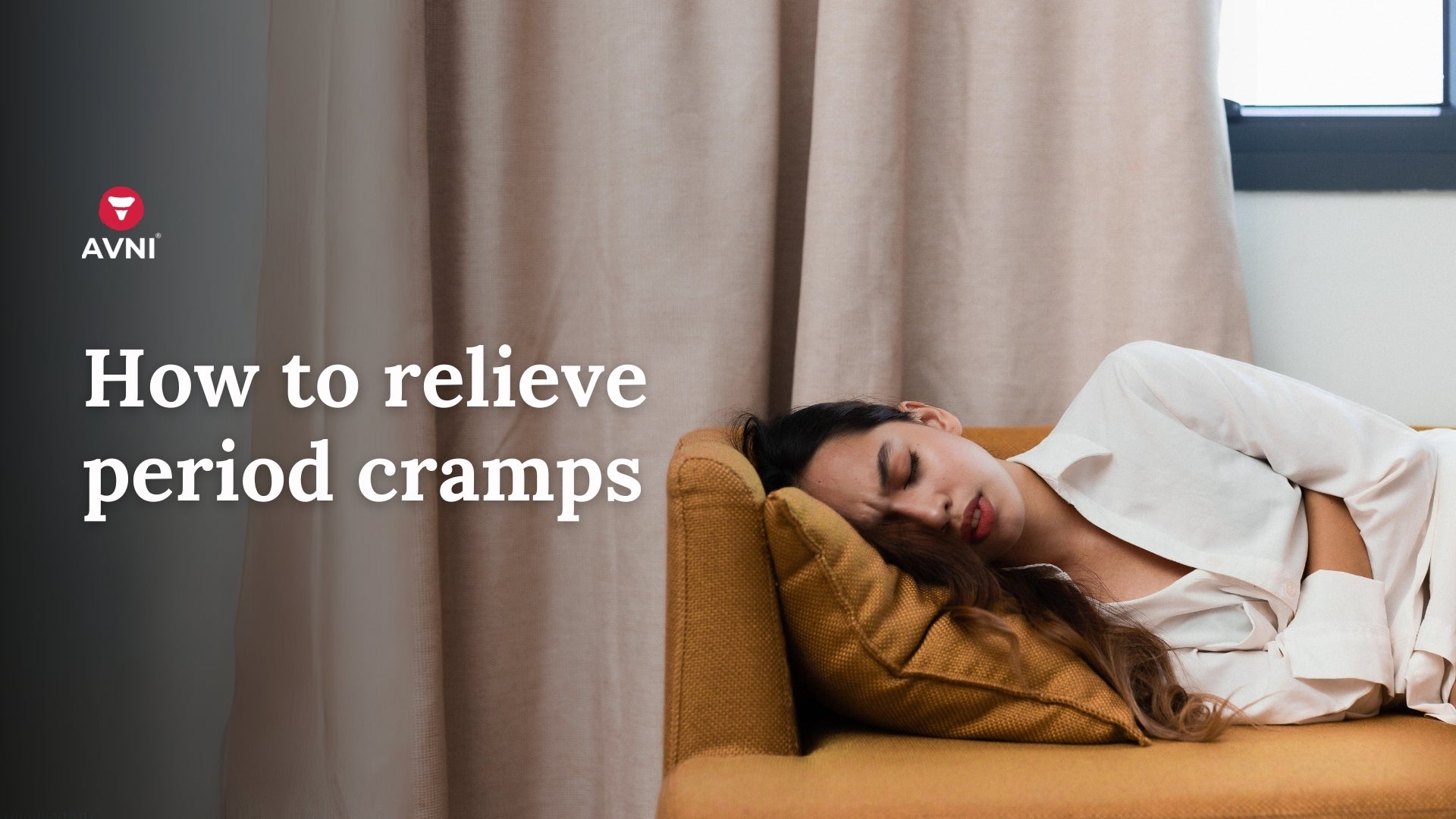
How to Relieve Period Cramps at Home?
Have you ever wondered why you get period cramps? That dull pain you feel down there is actually caused by several biological events and processes going on inside your body while you are on your periods.
All of these events are driven forward by the cyclical changes in your reproductive hormones. Hormones control the selection and development of your follicles, the release of each egg, and the preparation of your uterus for possible implantation.
The egg travels out of the ovary and is taken up by the fallopian tube. After its release, the egg has about 12–24 hours to be fertilized by sperm in the fallopian tube. If the egg isn’t fertilized within this short window, it begins to degrade. If it is fertilized, it travels to the uterus over the following 6-12 days, to possibly implant for pregnancy.
So, when the egg does not become fertilized as it travels down the fallopian tube on its way to the uterus, the endometrium (lining of the uterus) is shed and passes through the vagina, a process called menstruation.
During your menstrual period, your uterus contracts to help expel its lining. Hormonelike substances (prostaglandins) involved in pain and inflammation trigger uterine muscle contractions. Higher levels of prostaglandins are associated with more-severe menstrual cramps.
Other factors such as the recent delivery of a child, heavy menstrual flow, or being under 20 and just starting with your menstrual cycle can also lead to painful period cramps.
One of the most common questions asked on the internet is "How to Relieve Period Cramps at Home?"
Cramps suck. They suck a lot. These bouts of pain not only draw your energy but also interfere with your daily routine. When you're amid a painful cramp — you think about anything you can do to make that pain stop as soon as possible.

But what if there were ways to relieve period cramps at home?
Here are 8 proven (totally legit) home remedies for cramps that will help you make it through your period each month with a little less pain and a little more smile.
Home remedies to prevent period cramps
No one likes to get period cramps. It's annoying, and painful, and it feels like there's a tiny troll in your uterus that's trying to take over your body. There are a lot of non-traditional remedies and home treatment options to help with period cramps. Here is a list of 8 home remedies you can try this month if you're suffering from unbearable pain.
#1 Use a Heat Pad or Patch
It is possible to relax your uterus muscles by using a heated patch or wrap on your abdomen. Also, the heat stimulates blood circulation in the abdomen which reduces pain. An investigation published in 2004 found that taking over-the-counter pain relievers was not as effective as wearing a heat wrap or using a heated water bottle for cramps.The study also showed participants who used the heat wrap had less fatigue and fewer mood swings compared to those who didn't.You can buy abdominal heat patches from a nearby drugstore. Online electric heating pads and hot water bottles or bags are equally effective and readily available. They are good choices if you are spending some time at home and don't need to move around.
#2 Over-the-counter (OTC) medications
According to the American College of Obstetricians and Gynecologists —over-the-counter pain relievers like ibuprofen, naproxen, and aspirin are effective treatments for period cramps.
The medicines act against the very prostaglandins that cause the cramping and work best if the pills are taken at the first sign of cramps or pain.
Aspirin, naproxen, and ibuprofen are available at any drugstore. It is important to take these drugs seriously since they also have side effects. Be sure to take only as directed and talk to your doctor first if you are having a history of heart, liver, or kidney problems, or if you have asthma, ulcers, or other bleeding disorders.
#3 Perform low-intensity exercise or Yoga
Recent research suggests that low-to-medium-intensity aerobic exercise can help reduce period cramp pain.
Women who exercise for 30 minutes a day show significantly reduced period cramps. Exercise increases the oxygen availability in the uterus and relieves the spasms.
To fit an aerobic workout into your schedule, consider biking to work, going for a brisk walk at lunchtime, dancing to your favorite tunes, or playing a sport you enjoy. Nothing is a better substitute for a bad mood than having fun and working out.
Another study suggests that — like aerobic exercise, yoga can also help reduce period cramps.
In this study, experts found that women who participated in a 60 minutes yoga class once a week for twelve weeks showed significant reductions in their period pain.
Thus, a wide range of problems (from gut instability to hair loss and period cramps) can be treated with a combination of yoga or exercise and stress-busting.
#4 Take Supplements
Various studies suggest that dietary supplements can relieve period cramps. Though it's not exactly known how they work.
Some supplements that show promising results in reducing period pain include calcium, vitamin B6 and B1, vitamin E and vitamin D, magnesium, zinc, vitamin B12, and fish oil.
You can get these dietary supplements either online or at your native drugstore. Use as directed and talk to your doctor if you are on other medications, as they may interact with supplements.
#5 Dietary Changes
Taking supplements can ease period pain, but you also need to avoid certain foods that cause bloating, water retention, and distress.
Certain foods to stay away from when you have cramps include salty foods, caffeine, alcohol, and fatty foods.
A 2000 study found that a low-fat vegetarian diet reduced premenstrual syndrome and period pain. But remember it is prudent to try newer diets as well to keep your vitamin and mineral levels adequate.
#6 Try Acupuncture
There is evidence that certain acupuncture points have the ability to regulate blood flow through the abdominal cavity and relax the nervous system, which can calm muscular contractions. Acupuncture has been shown to reduce pain just as effectively as over-the-counter anti-inflammatory medicines.
Likely, these changes will also lead to improved digestion, better sleep, and a happier mood along with pain relief. However, you can consult an acupuncturist or naturopath if these measures don't improve your quality of life.
#7 Remain hydrated
Dehydration increases your chances of experiencing abdominal cramps during your period and stresses the body. Thus, it is always advisable to remain hydrated even on your normal days.
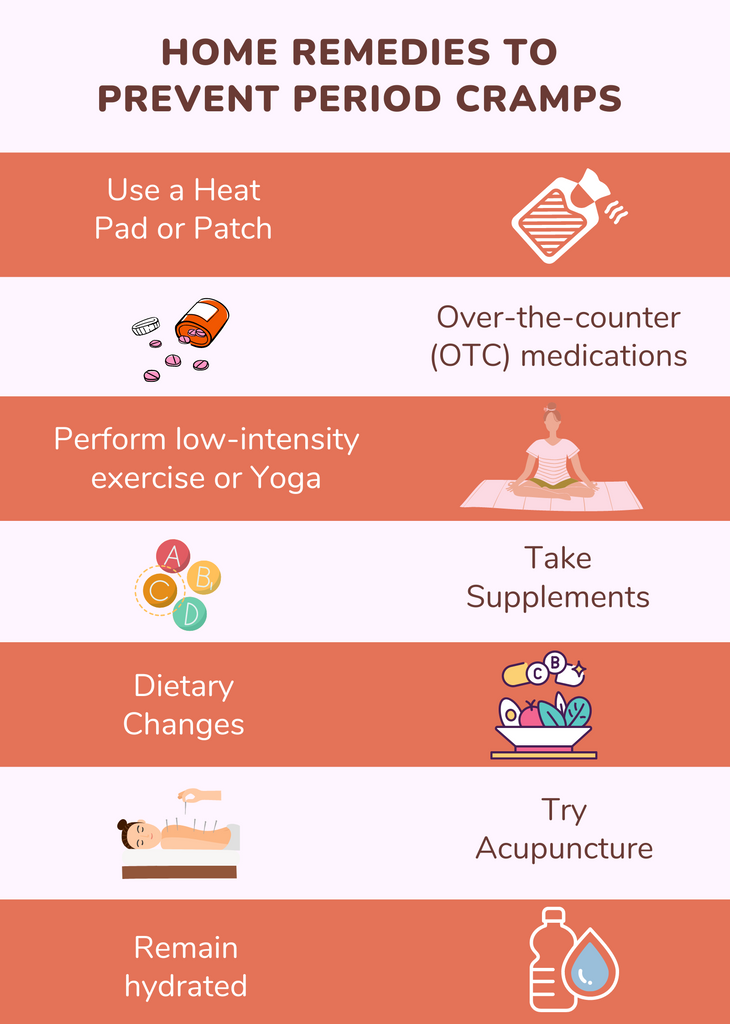
Set a goal to drink at least two to three liters of water per day.
Related articles:
1. Understanding a hybrid approach to managing your periods
2. How to regulate your periods: home tips and tricks
Bottom Line - When to visit a doctor?
There are times when period cramps can really make your life difficult. Fortunately, a combination of diet, exercise, and lifestyle modifications can help ease the pain and discomfort caused by these cramps.
But there are chances that extreme pain before or during your period can be an indication of a more serious health condition that needs immediate treatment. The conditions could be endometriosis, pelvic inflammatory disease, sexually transmitted infections, uterine fibroids, adenomyosis, or cervical stenosis.Therefore, you shouldn't ignore symptoms or changes in your body. If you are experiencing severe pain that interferes with your daily activities or if you have started having breathing symptoms and/or are observing medications aren't relieving your symptoms then you should make an appointment to see a doctor.
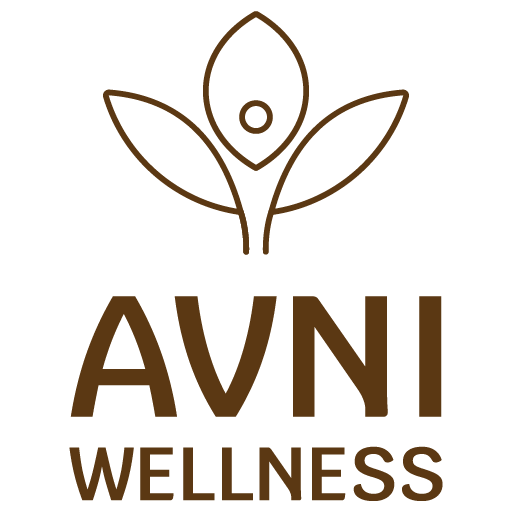
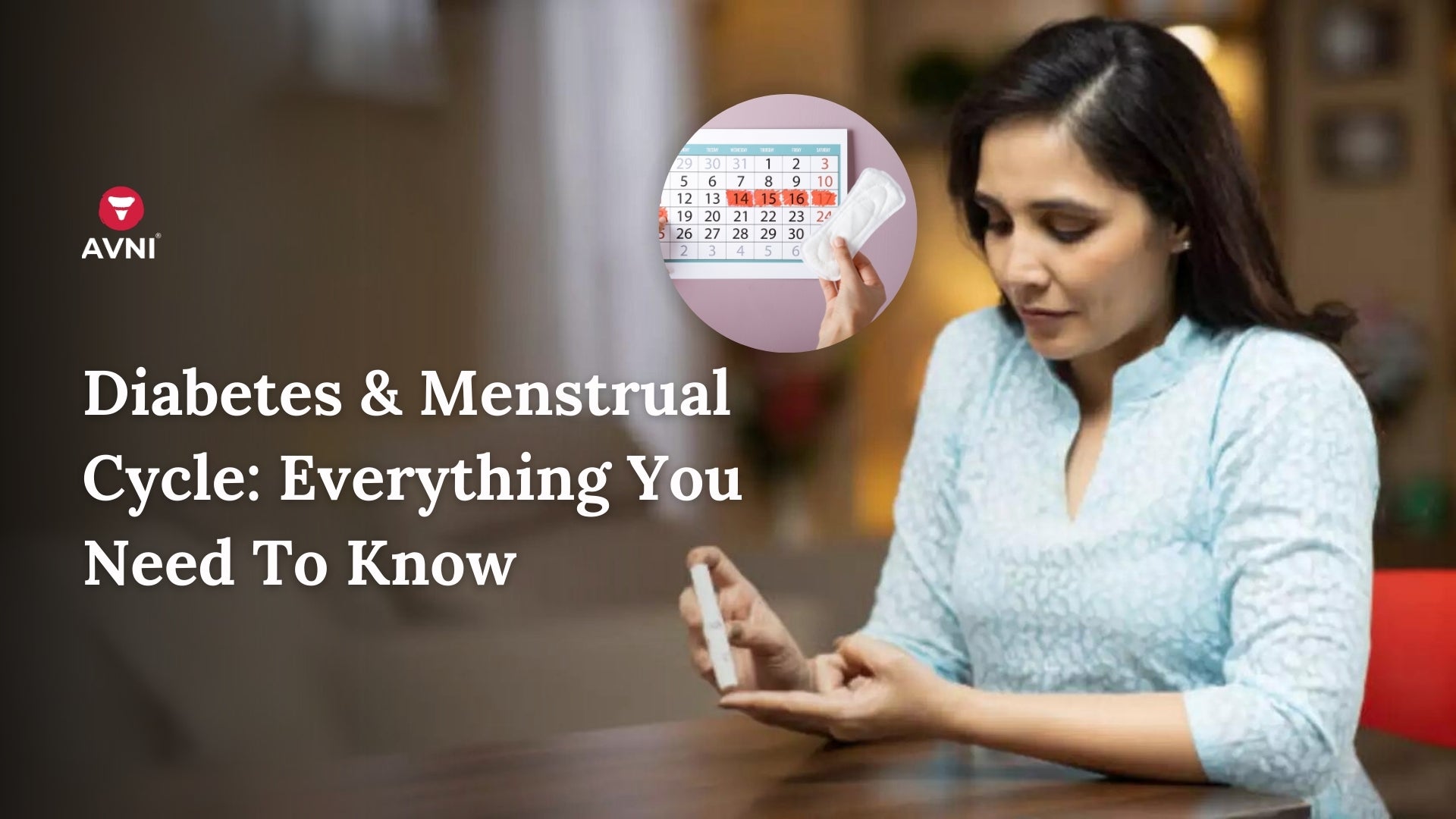
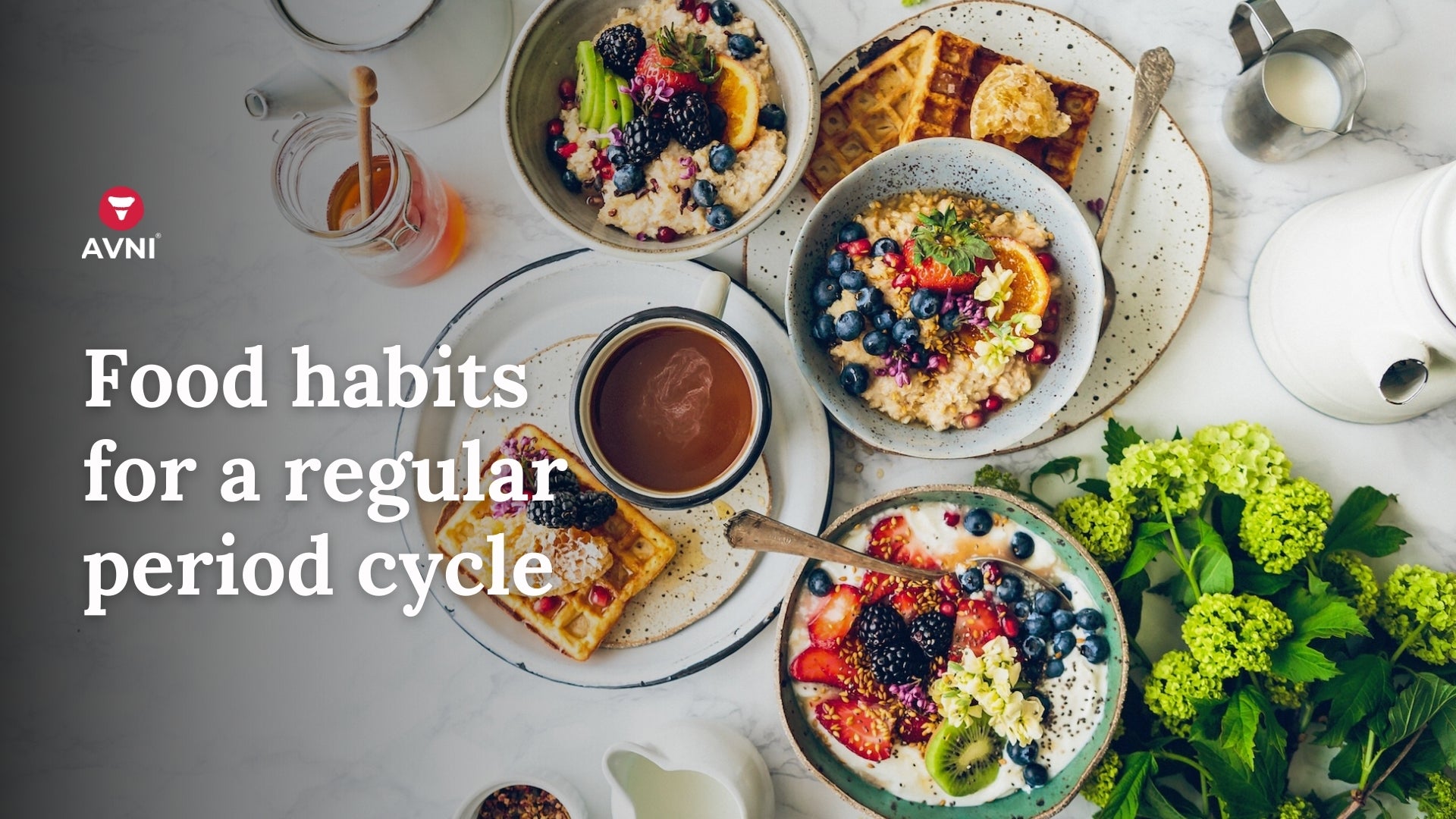
Leave a comment
This site is protected by hCaptcha and the hCaptcha Privacy Policy and Terms of Service apply.